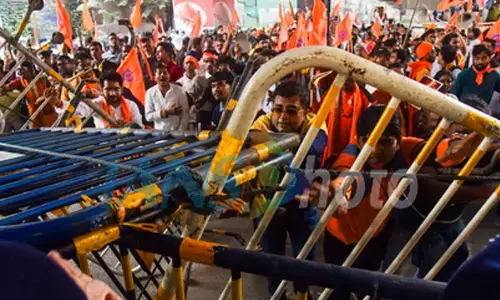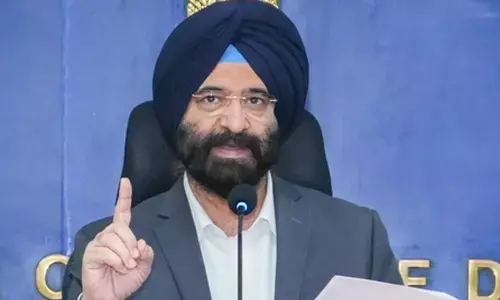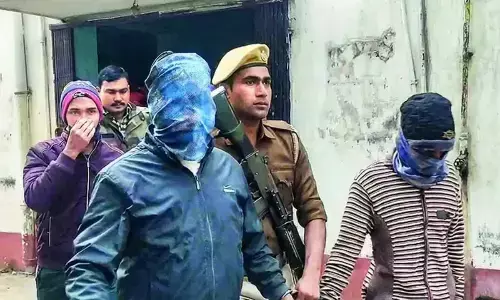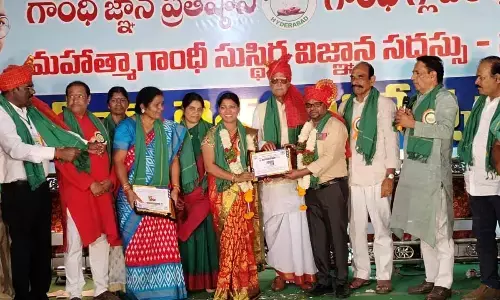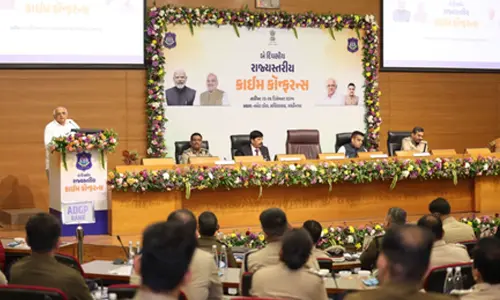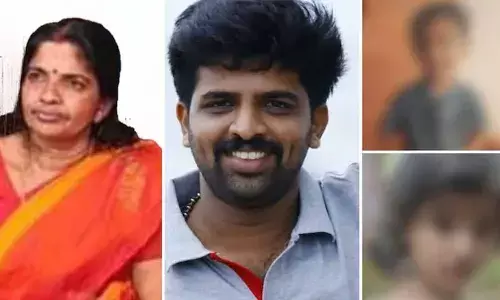Exploiting in guise of protectors
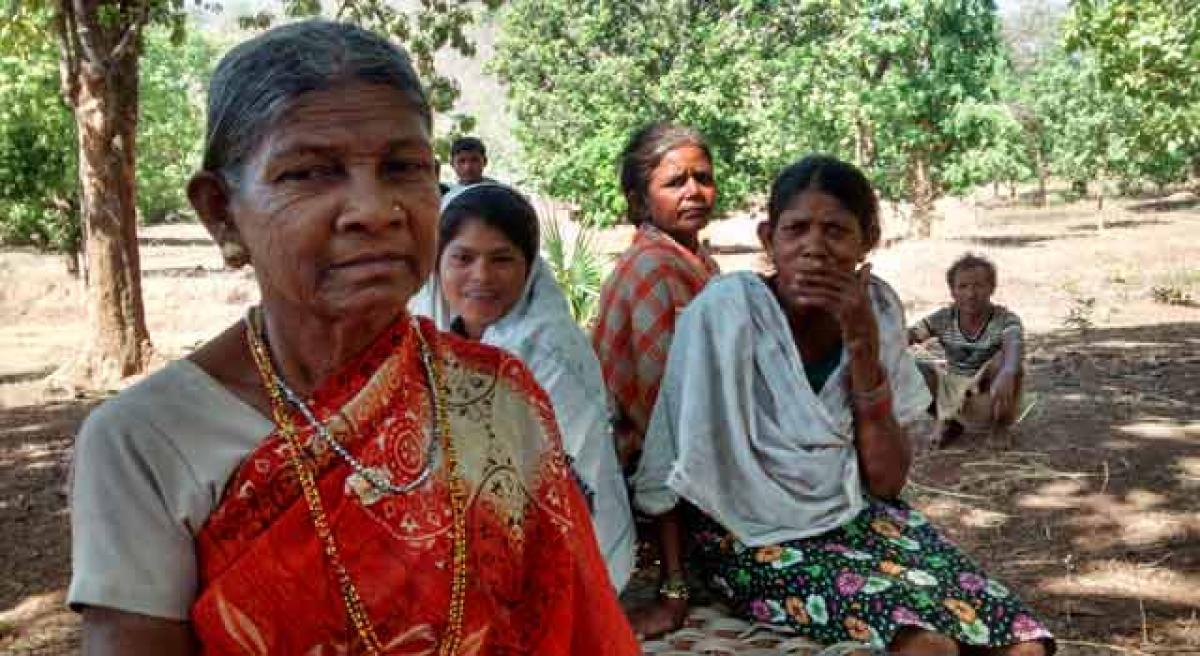
South Chhattisgarh. It is not a sensitive border area with implications for national security. There is no secessionist movement. But a prolonged, low-intensity war is being waged here.
South Chhattisgarh. It is not a sensitive border area with implications for national security. There is no secessionist movement. But a prolonged, low-intensity war is being waged here.
The state’s goal is to depopulate the area and free it for other uses. A casual visit makes this quite obvious. A team from ‘Women Against Sexual Violence and State Repression’ (WSS) along with independent activists visited Bijapur,
Chhattisgarh, between May 5 and 7, to verify facts about several instances of rape and violence that were being reported from the area.
Korcholi village ensconced some 14 kilometres into the forest under Gangalur thana of Bijapur block in Chhattisgarh, is a difficult destination to reach. There is no motorable road. The tractor track makes an excruciating, bone-shattering journey through deep ridges, streams, mango groves, pristine forest and a lot of minor vegetation that has dried crisp in the scorching summer heat. It takes three hours to negotiate those 14 kilometres.
The village itself is well spread out with houses far apart, neatly fenced, interspersed with clusters of a variety of trees. The quiet serenity of the place is deceptive, as the peace is broken frequently here when the security forces come on combing operations (gashti), looking for Maoists and their sympathisers.
Renu (name changed), is a young mother of two – a toddler and a nursing infant. She set out one January day this year, quite unaware of the security presence, to gather some firewood. She was suddenly accosted by three men in uniform, shoved around and dragged away from the village.
According to her, the security men were speaking both Gondi and Hindi and were in a uniform similar to that of the CRPF. She begged to be let off as her infant is waiting for her back home. Her loud protests annoyed the security men further. They took her to the forest two of them took turns to rape her while the others held her down.
In her video testimony, in deep humiliation, she said that two women of her village saw this and reported it in the village. One reason for her to speak up now and seek justice since everyone already knows what has happened.
Several young girls in the village had to stop schooling when security forces took over the school at Regadgatta near Cherpal. Some of the boys do go to ashram schools still, to study. The little schooling the girls had, along with their exposure to Andhra Pradesh, Telangana and other places as migrant labourers, has helped them understand and speak Telugu and Hindi fluently.
After translating Renu’s trauma, they recounted other instances of brutality by the security forces since October of 2015 as described by the victims.
In November 2015, a large security contingent descended from across the hills and stayed in Itavar. They forced a young man, Sukku Kunjam from Itavar to guide them to Korcholi, a nearby village.
When they came to Korcholi, Sukku Kunjam went to have food at an elder relative’s place. However, he decided to flee with other men there and the security men began firing in the air and threatening to kill everyone.
They shot and killed Sukku Kunjam. They put his body in a plastic wrap, dragged it away to the thana and declared him a Naxalite.
During the same incident, two girls, Sukki and Jamli were also picked up from Itavar by the security men. Sukki was picked up first. Her sister Jamli went chasing after them. They dragged her also deep into the forest.
There they tore their clothes, beat them and undressed them. The girls were held in the forest for two days. Only when a helicopter arrived at a nearby village, Doval Nendra, the girls were let off, they recalled.
The villagers say that this was around November 23 and 25, 2015. It is not known what has happened to the girls over the two days, but the villagers are not saying that they were raped.
Other girls who go out to graze cattle had similar experiences to narrate. In January, Somli, Mangli and Tulsi went to graze cattle. The men on gashti wanted to know why they were dressed in school uniforms and whether they go to school.
They were also beaten up, their clothes were torn. Only when an elderly woman of the village rebuked them, asking if they come to the villages on gashti to molest girls, did they go away.
A number of men and women reported that the security men walk into homes, take rice, poultry and other edibles, make their food and eat. If anyone objects, they break the utensils and burn the produce before leaving.
They take away whatever money they find. In one of the households, they took away the photo of a young girl who was on a visit with her grandmother, claiming that she was a Naxal. In another instance, they burnt the fine clothes the family got made for a wedding.
The borewell at Korcholi, the villagers said, was broken. The villagers got it repaired but it was broken again. Now they have to go far to the river to wash clothes and to fetch drinking water. They have to walk miles through the forest to access basic necessities like groceries and provisions.
If there is a security patrol around, the men are automatically under threat and women are exposed to sexual harassment and violence.
Similar stories of gross abuse of human rights and lawlessness on the part of the security forces were reported from Todka, Saonar and Itavar. The indiscriminate state repression armed with the arbitrary powers of the Chhattisgarh Special Public Security Act (CSPSA), however, has not succeeded in intimidating the people.
Some 100 of them set out from their villages to meet Ram Mohan, ex-DG Border Security Force and Dr Virginius Xaxa, Director of TISS (Guwahati), members of the team of High-Level Committee headed by Justice Suresh at Bijapur circuit house on May 7.
The women testified before the commission about the daily harassment and relentless violence and abuse that they face from the security establishment. They narrated the widespread instances of sexual violence and humiliation that they are subjected to, and spoke of the lack of any space to live their lives in peace in their villages.
The Committee expressed dismay at the gross violation of human rights that has become a routine part of life in Chhattisgarh.
Bijapur, a district carved out from Dantewada in 2011, is one of the most sparsely populated districts with a population of just 2,55,000 people and a density of 39 people per square kilometre. It is also one of the poorest with second lowest literacy and severe malnourishment among its people.
The state could not provide the people even basic necessities like drinking water, education and health. There are hardly any roads. None of the mobile services, except BSNL, have coverage in the area.
Even that is not available in the interior villages. Where it is available, it is blocked often when the security forces move from place to place. Word of mouth is the only workable mode of communication in these parts.
Seven to eight Hindi newspapers come into town around one in the afternoon. English newspapers are not available. In such a district, for a population of just 2,55,000, there are over 240 security camps with over 20,000 paramilitary personnel stationed in the area. Every few kilometres there is a heavily fortified security camp.
Having militarised the place, the state is in the process of evicting the people from their habitat to hand over the vast pristine forests for corporate exploitation. Just a few months back, the Chhattisgarh government removed traditional rights of adivasis on forest lands.
The state chooses not to link the crisis of drought in large parts of the country and the depleting forest cover. The economic indices like the GDP that both the central and the state governments (irrespective of their political colour) worship are based on extractive industries that devour forests and degrade the environment.
This development model is being enforced at a huge human cost where the most basic rights of the citizens like the right to life and livelihoods, and liberty are suspended through armed repression.
These instances of rape and loot in the villages follow close on heels of several similar reports from Bijapur, Sukma and Dantewada region over the last six months. WSS and the lawyers working in the area ensured that the victims testified and filed FIRs in the earlier cases.
In the Korcholi complaints, the police initially agreed to file FIRs before members of the Justice Suresh Commission but refused to do so later, accepting just a complaint letter based on which they propose to conduct a preliminary enquiry.
This violates the Supreme Court directives on cognizable offences under Section 154 of Cr PC, which mandate that an FIR must be filed and an enquiry initiated in cases of rape.
In a telling comment, Soni Sori in her speech at Hyderabad at a public meeting of Civil Liberties Committee on April 30, 2016, categorically said that the state is using Maoism as an excuse to wage a war against her people and to evict them from their lands.
Soni Sori, who was in Hyderabad for a medical check-up, said that she was able to save her school when the Maoists agreed not to attack her school provided it is not used as a base for the security forces. But her success in saving the school did not last long as the security forces began going after her nephew, herself and her other family members.
Her husband was imprisoned who later died; she herself was in jail and was put through some of the most gruesome instances of sexual abuse and torture in custody. Successive governments rewarded Ankit Garg, who was accused of supervising her torture.
Officers like IG SRP Kalluri, who openly declares depopulation of the area as his Mission 2016, are given unlimited powers to function with impunity in Bastar area.
Instances of repression are occurring unabated, continuing not just a genocidal onslaught on the tribal populations in the area, but a strategic war to capture and hand over the vast natural resources to favoured corporations. A classic case of accumulation by dispossession.
There can be a respite for the people of South Chhattisgarh only through a process of reconciliation that compensates victims, rethinks the development model, and withdraws the draconian Chhattisgarh Special Public Security Act (CSPSA).
As things stand, because of the intense repression, the victims do not trust the state machinery. And they are not afraid to speak up.
By:Padmaja Shaw
Also Read:








